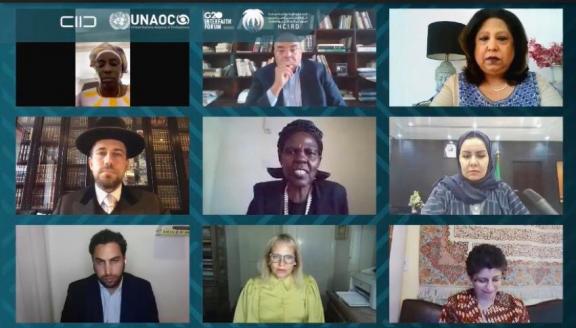Abuom voiced the question aloud: “The impact of COViD —and we have seen it—how is it impacting the faith communities? The key question when it comes to young men and women is that fact that they are challenging us to seek ways in which we can live sustainably so everyone has dignity, so everyone is recognized and respected.”
Abuom emphasized the need for us to think through ways forward but also think through the challenges. “It is a question of human dignity,” she said. “It is a question of respect. Our talents have to be utilized in a manner that will achieve sustainable development for all.”
Keynote speaker of the plenary, Rev. Kjell Magne Bondevik, former prime minister of Norway and founder and executive chair of the Oslo Center, emphasized the vital role of interreligious dialogue.
“We should also focus more on our common values,” he said. “All major world religions teach the virtue of peace—not just peace in the sense of absence of war but peace between people.”
The world situation has forced us to work hard to reduce tension between religious groups, added Bondevik. “It may start from the top down and from the grassroots up,” he said. “Especially, young people can be mobilized to promote respect, understanding and tolerance.”
Religious leaders have a great responsibility, he said. “They reach out to so many people.”
Speakers at the plenary also highlighted how economic inequality is particularly pronounced for certain people. “Nine-hundred-eighty million women around the globe are not able to receive access to basic financial services,” said Dr Hala Al-Tuwaijri, secretary general of the Family Affairs Council of the Kingdom of Saudi Arabia and Head of the Women's Empowerment Team at G20 Riyadh.

G20 Interfaith forum 2020, session on the empowerment of women, youth and vulnerable people, 15 October 2020.
Prof. Ursula Basset, professor at Pontificia Universidad Católica, Argentina, noted that the quest of empowerment has created narratives of women. “The depiction of women by the narrative of feminism is still a depiction whose outcome depends on too many factors,” she said.
We celebrate greatly when a woman has reached a place in which we would otherwise find men, said Basset. “This is a very noble thing to do,” she said. “But this brings me back to the issue of the silences in the era of empowerment.”
She asked about the “silent heroes” to whom we owe our very existence. “I’m in favor of the progress of celebrating every woman for what she is,” said Basset. “There is no empowerment if it does not address every woman for what they are, for what they choose to be.”
Mr. Ahmad Alhendawi, secretary-general of the World Organization of the Scout Movement, also spoke of the narratives, the kind that often portray young people inaccurately. “We are seeing today quite a destructive narrative painting a picture where young people are not cooperative or not supportive,” he said but in fact young people are facing complex challenges. “These challenges require the global leaders at all levels to really step up to the challenge and really understand.”
Dr Azza Karam, secretary general of Religions for Peace, commended faith communities for the work they have done in promoting empowerment. "But when religions come together—that’s the moment of the greatest boost to any discourse around gender equality and women’s empowerment,” said Karam. “We heard a lot about COVID and the challenges it imposes.”
Karam said that, with each challenge, comes an opportunity as well. “In order to prevent the spread of the virus, we see, with the lockdowns, a spike in gender-based violence—but we also see a remarkable spike in safeguarding and nurturing the advancement of women’s health and their earning power globally,” she said. “The global pandemic today is but one of what we fear will be many crises.”
If religious groups are going to be working in crisis mode during the coming years, it’s important they work together. “Social cohesion is the first victim of what we’re confronting,” she said. “The key, the magic, is collaboration.”
Going forward, Religions for Peace and other groups are making a commitment to work with others, she added. “If we did not have the United Nations before, we would have to create it now,” she said. “Global civil society will never be able to exist without a very powerful multilateral system.”
The G20 Interfaith Forum is hosted by KAICIID, or the International Dialogue Centre, dedicated to the facilitation of dialogue between followers of different cultures and religions.
WCC moderator to lead plenary at upcoming G20 Interfaith Forum






